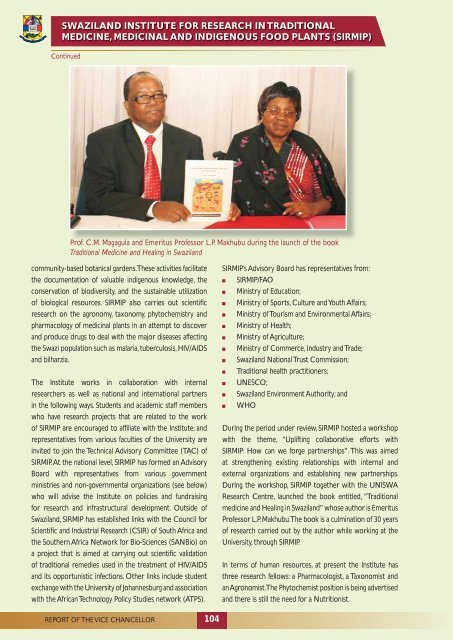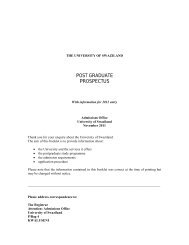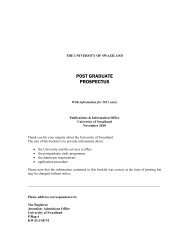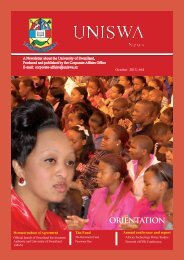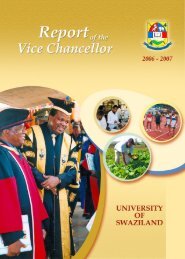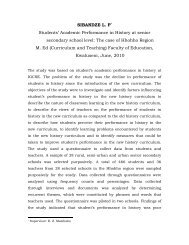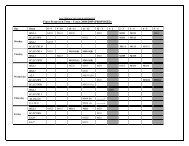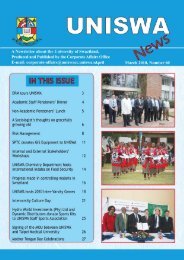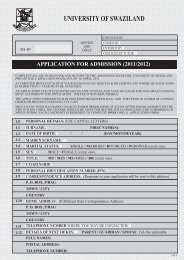VISION MISSION
2010/2011 - University of Swaziland
2010/2011 - University of Swaziland
- No tags were found...
Create successful ePaper yourself
Turn your PDF publications into a flip-book with our unique Google optimized e-Paper software.
SWAZILAND INSTITUTE FOR RESEARCH IN TRADITIONALMEDICINE, MEDICINAL AND INDIGENOUS FOOD PLANTS (SIRMIP)ContinuedProf. C.M. Magagula and Emeritus Professor L.P. Makhubu during the launch of the bookTraditional Medicine and Healing in Swazilandcommunity-based botanical gardens. These activities facilitatethe documentation of valuable indigenous knowledge, theconservation of biodiversity, and the sustainable utilizationof biological resources. SIRMIP also carries out scientificresearch on the agronomy, taxonomy, phytochemistry andpharmacology of medicinal plants in an attempt to discoverand produce drugs to deal with the major diseases affectingthe Swazi population such as malaria, tuberculosis, HIV/AIDSand bilharzia.The Institute works in collaboration with internalresearchers as well as national and international partnersin the following ways. Students and academic staff memberswho have research projects that are related to the workof SIRMIP are encouraged to affiliate with the Institute; andrepresentatives from various faculties of the University areinvited to join the Technical Advisory Committee (TAC) ofSIRMIP. At the national level, SIRMIP has formed an AdvisoryBoard with representatives from various governmentministries and non-governmental organizations (see below)who will advise the Institute on policies and fundraisingfor research and infrastructural development. Outside ofSwaziland, SIRMIP has established links with the Council forScientific and Industrial Research (CSIR) of South Africa andthe Southern Africa Network for Bio-Sciences (SANBio) ona project that is aimed at carrying out scientific validationof traditional remedies used in the treatment of HIV/AIDSand its opportunistic infections. Other links include studentexchange with the University of Johannesburg and associationwith the African Technology Policy Studies network (ATPS).SIRMIP’s Advisory Board has representatives from:SIRMIP/FAOMinistry of Education;Ministry of Sports, Culture and Youth Affairs;Ministry of Tourism and Environmental Affairs;Ministry of Health;Ministry of Agriculture;Ministry of Commerce, Industry and Trade;Swaziland National Trust Commission;Traditional health practitioners;UNESCO;Swaziland Environment Authority; andWHODuring the period under review, SIRMIP hosted a workshopwith the theme, “Uplifting collaborative efforts withSIRMIP: How can we forge partnerships”. This was aimedat strengthening existing relationships with internal andexternal organizations and establishing new partnerships.During the workshop, SIRMIP together with the UNISWAResearch Centre, launched the book entitled, “Traditionalmedicine and Healing in Swaziland” whose author is EmeritusProfessor L.P. Makhubu. The book is a culmination of 30 yearsof research carried out by the author while working at theUniversity, through SIRMIP.In terms of human resources, at present the Institute hasthree research fellows: a Pharmacologist, a Taxonomist andan Agronomist. The Phytochemist position is being advertisedand there is still the need for a Nutritionist.REPORT OF THE VICE CHANCELLOR 10406


